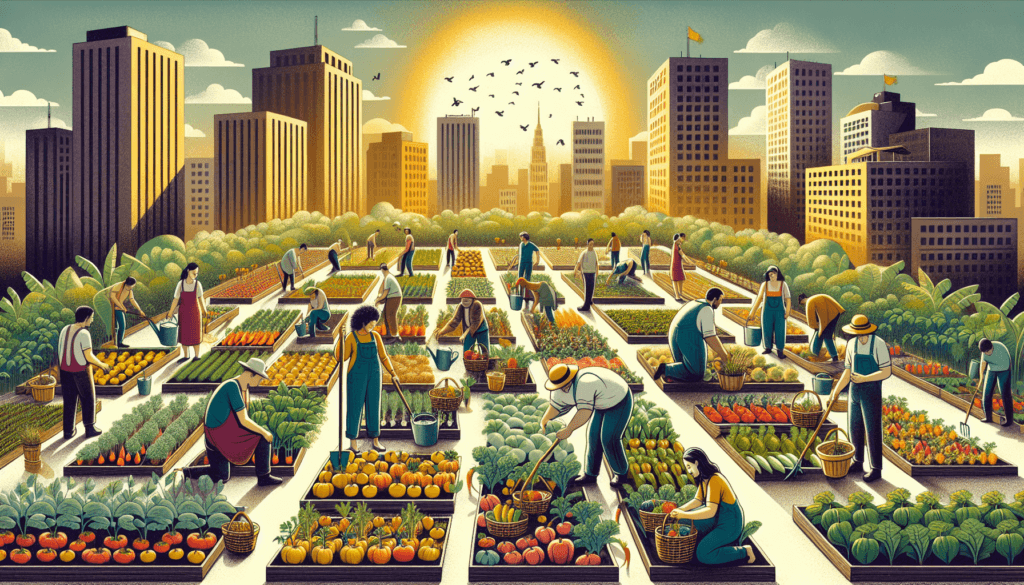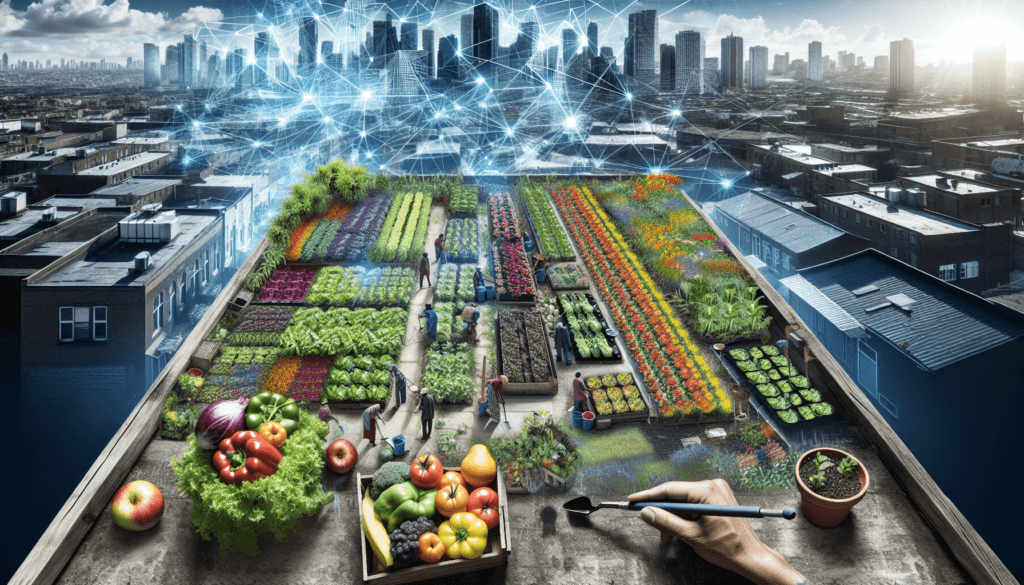Imagine a world where everyone has access to fresh, nutritious food, and the cycles of poverty are broken. Urban farming holds the key to making this vision a reality. By utilizing unused spaces in cities, such as rooftops or abandoned lots, urban farming empowers communities to grow their own food, reducing their dependence on expensive grocery stores and improving their overall well-being. This article will explore the ways in which urban farming can help decrease poverty rates, providing individuals and communities with the opportunity to cultivate not just crops, but also hope and a brighter future.
Increases Access to Affordable and Nutritious Food
Increases availability of fresh produce in urban areas
Urban farming plays a crucial role in increasing access to fresh and affordable produce in areas where it may be scarce. By utilizing small spaces and vacant lots, urban farms bring vibrant green spaces into urban environments, transforming empty spaces into thriving gardens. These farms can cultivate a wide range of fruits, vegetables, and herbs, providing a diverse selection of nutritious options for the local community.
Reduces reliance on expensive and unhealthy processed foods
One of the key benefits of urban farming is its ability to reduce reliance on expensive and unhealthy processed foods. Many low-income communities often lack access to affordable, fresh produce, leading to a dependence on cheaper, processed alternatives. By establishing urban farms, these communities can grow their own fruits and vegetables, reducing their financial burden and improving the quality of their diets.
Improves food security for low-income communities
Food security is a fundamental aspect of reducing poverty, and urban farming can contribute significantly to achieving it. By producing food locally, urban farms ensure a more reliable and efficient food supply for low-income communities. Rather than relying on distant sources, urban farmers can provide a consistent and accessible source of nutritious food, reducing the vulnerability of these communities to food shortages and price fluctuations.
Creates Employment Opportunities
Provides job opportunities for local residents
Urban farming creates valuable job opportunities for local residents, particularly those who may face challenges in finding employment. From tending to the crops and managing the farm, to distributing the produce and selling it at farmers’ markets, there are various roles within urban farming that can provide meaningful and sustainable employment. This not only improves the economic well-being of individuals but also contributes to the overall growth of the community.
Stimulates local economy
When urban farms thrive, they stimulate the local economy by creating a demand for various goods and services. Local businesses benefit from increased foot traffic, as people visit farmers’ markets and other outlets selling the produce. Additionally, farm operations require farming supplies, equipment, and tools, all of which can be procured from local merchants. This circulation of money within the community helps boost economic activity and supports local businesses.
Encourages entrepreneurship
Urban farming presents an opportunity for individuals to delve into entrepreneurship and cultivate their own businesses. Aspiring farmers can start their own small-scale urban farms, selling their produce directly to consumers or local restaurants. The entrepreneurial aspect of urban farming not only empowers individuals to take control of their own livelihoods but also fosters innovation and creativity within the community.

Enhances Community Resilience
Strengthens community ties and social cohesion
Urban farming encourages community members to come together and actively participate in the cultivation and maintenance of the farms. Working side by side to grow food creates a sense of shared purpose and strengthens community ties. This collaboration helps build social cohesion, fostering a sense of belonging and unity among residents. The act of growing food collectively can also serve as a catalyst for organizing community events and activities, further solidifying these bonds.
Provides a sense of ownership and pride
Urban farms offer a sense of shared ownership and pride within the community. When individuals are involved in growing their own food, they develop a deeper connection to the land and a sense of responsibility towards sustaining the farm. This sense of ownership instills pride in the community’s achievements, as they witness the transformation of previously unused spaces into productive and fruitful gardens. The resulting beauty and abundance further contribute to an overall improved quality of life and community spirit.
Creates a more sustainable and self-reliant community
By engaging in urban farming, communities become more self-reliant and sustainable. Growing their own food reduces dependence on external sources, minimizing the environmental impact associated with long-distance transport and industrial farming practices. Moreover, urban farms often employ organic and sustainable farming techniques, minimizing the use of chemical inputs and promoting biodiversity. By embracing these practices, communities actively contribute to building a more resilient and environmentally conscious society.
Improves Health and Nutrition
Increases consumption of fresh and nutritious food
Urban farming directly contributes to improved health and nutrition by increasing access to fresh and nutritious food. The availability of locally grown produce ensures that community members have a wider range of options to choose from when planning their meals. By incorporating more fruits, vegetables, and herbs into their diets, individuals can enjoy a higher intake of essential vitamins, minerals, and antioxidants, leading to improved overall health and well-being.
Reduces health issues related to poor diet
Poor diet is one of the leading contributors to various health issues, including obesity, diabetes, and heart disease. Urban farming addresses this problem by providing communities with healthier food options. By consuming fresh produce, individuals can reduce their intake of processed and unhealthy foods, lowering their risk of developing diet-related health problems. This shift towards a more nutritious diet can have long-term positive effects on individuals’ physical health, preventing or managing chronic illnesses.
Promotes healthier lifestyle choices
Engaging in urban farming promotes healthier lifestyle choices beyond just improved nutrition. The physical activity involved in farming, such as planting, weeding, and harvesting, contributes to a more active lifestyle. Additionally, urban farming provides an opportunity for individuals to reconnect with nature and spend time outdoors, which positively impacts mental health. By cultivating a healthier lifestyle, urban farming can empower individuals to take charge of their well-being and lead happier, more fulfilling lives.

Reduces Environmental Impact
Conserves water resources through efficient farming techniques
Urban farming embraces efficient farming techniques that prioritize water conservation. Techniques such as drip irrigation and hydroponics allow farmers to minimize water waste by delivering water directly to the plants’ roots, reducing evaporative losses. By optimizing water usage, urban farms can significantly reduce their water footprint, contributing to the conservation of this precious resource, particularly in water-scarce areas.
Promotes biodiversity and supports pollinators
Many urban farms prioritize organic and sustainable practices, creating environments that support biodiversity and provide habitats for pollinators. By avoiding the use of chemical pesticides and herbicides, urban farms protect beneficial insects and encourage the presence of bees, butterflies, and other pollinators. These pollinators, in turn, play a vital role in the reproduction of plants, ensuring the production of healthy and abundant crops.
Reduces transportation emissions and food waste
Urban farming reduces the need for long-distance transportation of food, which contributes to carbon emissions and pollution. By cultivating food locally, urban farms eliminate or minimize the carbon footprint associated with transporting produce from distant farms. Furthermore, urban farming can reduce food waste by harvesting crops at peak ripeness and delivering them directly to consumers. This direct farm-to-table approach reduces the amount of food that goes to waste due to spoilage during lengthy transport or storage.
Facilitates Education and Skill Development
Provides opportunities for learning about agriculture and sustainable practices
Urban farming serves as an educational platform, providing opportunities for individuals to learn about agriculture and sustainable farming practices. Schools, community centers, and organizations can incorporate urban farms into their curriculum or programs, offering hands-on experiences for children and adults alike. From understanding the basics of plant growth to learning about composting and soil health, urban farming facilitates valuable knowledge transfer and empowers individuals to adopt sustainable practices in their own lives.
Teaches important life skills and improves knowledge about nutrition
Engaging in urban farming equips individuals with important life skills beyond just agricultural knowledge. By participating in the cultivation process, individuals develop skills in problem-solving, teamwork, and time management. Furthermore, urban farming provides a practical context for learning about nutrition, as individuals gain a deeper understanding of the nutritional value of different fruits and vegetables. This knowledge empowers individuals to make informed dietary choices and develop healthier eating habits.
Fosters a sense of environmental stewardship
Urban farming instills a sense of environmental stewardship within individuals and communities. By witnessing the direct impact of their actions on the environment, individuals become more conscious of their role in preserving and protecting the natural world. Urban farmers often adopt sustainable practices, such as composting and using organic fertilizers, further reinforcing this sense of environmental responsibility. This cultivation of environmental stewardship extends beyond the farm, inspiring individuals to adopt sustainable practices in other aspects of their lives.

Strengthens Urban and Rural Connections
Bridges the gap between urban and rural communities
Urban farming serves as a bridge between urban and rural communities, fostering connections and understanding between the two. By engaging in agriculture within urban environments, individuals gain a deeper appreciation for the work done by farmers in rural areas. This connection can lead to increased support for rural farming practices, as well as collaborations and knowledge sharing between urban and rural farmers, creating a more unified and resilient agricultural sector.
Creates partnerships and collaboration between urban and rural farmers
Urban farming provides opportunities for partnerships and collaboration between urban and rural farmers. Both communities can benefit from knowledge exchange, sharing insights on innovative farming techniques, sustainable practices, and crop diversification. This collaboration strengthens both sectors and allows for the adoption of best practices, ultimately leading to increased productivity, efficiency, and sustainability in agriculture as a whole.
Increases understanding and appreciation of agriculture
By bringing agriculture closer to urban areas, urban farming increases the general understanding and appreciation of farming practices. Many urban dwellers have limited exposure to agriculture and may not fully understand where their food comes from or the challenges faced by farmers. Urban farming showcases the hard work and dedication required to produce food, leading to a greater appreciation for the agricultural sector and the value it brings to society. This increased understanding can lead to support for policies and initiatives that prioritize sustainable agriculture and food security.
Addresses Food Deserts
Brings healthy food options to areas with limited access to fresh produce
Urban farming plays a vital role in addressing food deserts, which are areas with limited access to fresh and healthy food options. By establishing urban farms in these areas, communities gain immediate access to fresh produce that may have otherwise been unavailable. This improved availability of nutritious food allows individuals and families to make healthier choices and fosters a positive impact on their overall well-being.
Eliminates food deserts and improves food equity
One of the primary goals of urban farming is to eliminate food deserts and improve food equity. By cultivating food locally and making it accessible to all community members, urban farms contribute to creating a more equitable food system. Individuals living in low-income areas or areas previously designated as food deserts now have access to fresh, affordable, and nutritious produce, ensuring that access to healthy food is not determined by socioeconomic factors.
Reduces disparities in health outcomes
Food deserts often contribute to disparities in health outcomes, with residents of these areas experiencing higher rates of diet-related health issues. Urban farming helps address these disparities by providing consistent access to fresh produce and promoting healthier eating habits. By increasing access to nutritious food, urban farms contribute to improved health outcomes in these communities, narrowing the gap in health disparities and positively impacting the overall well-being of residents.

Promotes Sustainable and Efficient Resource Use
Utilizes small spaces and vacant lots for productive farming
Urban farming maximizes available space by utilizing small plots of land and vacant lots that may otherwise go unused. By converting these spaces into productive farms, urban farmers make efficient use of resources without requiring large tracts of land. This approach allows for productive farming within urban environments and showcases the potential for sustainable agriculture in areas with limited space.
Optimizes resource use through vertical farming and hydroponics
To maximize resource efficiency, urban farming often incorporates innovative techniques such as vertical farming and hydroponics. Vertical farming utilizes vertical space, allowing farmers to grow crops on multiple levels, optimizing the use of land. Hydroponics, on the other hand, involves growing plants in nutrient-rich water without soil, reducing water consumption and improving productivity. These techniques reduce the reliance on traditional farming methods while utilizing resources in an efficient and sustainable manner.
Reduces reliance on chemical inputs and promotes organic farming
Urban farming often emphasizes organic and sustainable farming practices, reducing reliance on chemical inputs and promoting healthier ecosystems. By avoiding the use of chemical pesticides and fertilizers, urban farmers protect the environment and the health of their communities. Organic farming methods improve soil health, support beneficial insects, and promote biodiversity, resulting in a more sustainable and resilient food system.
Supports Social and Economic Equity
Reduces income inequality through job creation and entrepreneurship
Urban farming contributes to reducing income inequality by creating job opportunities and supporting entrepreneurship in low-income communities. By providing employment in farming and related sectors, urban farms contribute to a more equitable distribution of wealth within the community. Additionally, the opportunity for entrepreneurship allows individuals to uplift their financial situations and take control of their own livelihoods. This reduction in income inequality helps create more inclusive and prosperous communities.
Provides opportunities for marginalized communities to improve their livelihoods
Marginalized communities often face barriers to accessing quality employment and economic opportunities. Urban farming provides valuable opportunities for these communities to improve their livelihoods. Whether it is through job opportunities or entrepreneurship, urban farms offer a path to economic empowerment and self-sufficiency. This support allows marginalized individuals to overcome systemic barriers and contribute actively to their communities.
Promotes inclusive and equitable access to nutritious food
In addition to economic opportunities, urban farming promotes inclusive and equitable access to nutritious food. By establishing farms in areas that have traditionally faced barriers in accessing fresh produce, urban farms contribute to food justice. This focus on equity ensures that all community members have the opportunity to lead healthy lives and make choices that prioritize their well-being. By addressing both economic and food access disparities, urban farming creates a more just and equitable society.
Urban farming presents a comprehensive solution to various societal challenges, benefiting communities in multiple ways. By increasing access to affordable and nutritious food, creating employment opportunities, enhancing community resilience, improving health and nutrition, reducing environmental impact, facilitating education and skill development, strengthening connections between urban and rural areas, addressing food deserts, promoting sustainable resource use, and supporting social and economic equity, urban farming can play a pivotal role in reducing poverty and building thriving communities. Through its multifaceted approach and positive impact, urban farming exemplifies the power of localized and sustainable solutions to create lasting change. As communities embrace urban farming initiatives, they not only address immediate needs but also lay the foundation for a more equitable and prosperous future.



